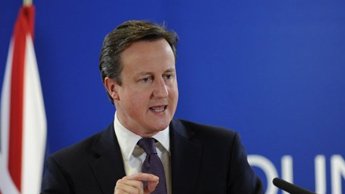News, December 2011
www.aljazeerah.info
Archives
Mission & Name
Conflict Terminology
Editorials
Gaza Holocaust
Gulf War
Isdood
Islam
News
News Photos
Opinion Editorials
US Foreign Policy (Dr. El-Najjar's Articles)
|
Editorial Note: The following news reports are summaries from original sources. They may also include corrections of Arabic names and political terminology. Comments are in parentheses. |
Nick Clegg says EU treaty veto is 'bad for Britain'

British Deputy Prime Minister Nick Clegg exposed a coalition rift on Sunday when he said he was opposed to Prime Minister David Cameron's veto on EU treaty change, saying it was "bad for Britain" and leaves the UK "isolated."
REUTERS - British Deputy Prime Minister Nick Clegg exposed coalition tensions over Europe on Sunday when he said he was “bitterly disappointed” by the outcome of the European Union summit and had told Prime Minister David Cameron it was “bad for Britain”.
Clegg, who leads the small pro-Europe Liberal Democrats, denied that the Conservative-led coalition which took office in May 2010 with a deficit-cutting agenda could now collapse.
“It would be even more damaging for us as a country if the coalition government were now to fall apart. That would create economic disaster for the country at a time of great economic uncertainty,” said Clegg, leader of the Liberal Democrats.
Clegg turned his fire on eurosceptic members of the Conservative Party who are pressing Cameron to follow up his veto on EU treaty change with a referendum on Britain’s membership of the 27-nation bloc.
“A Britain which leaves the EU will be considered to be irrelevant by Washington and would be considered a pygmy in the world when I want us to stand tall and lead in the world,” Clegg told BBC TV.
Britain on Friday opted out of a plan to forge ahead with a new European Union treaty with a tougher deficit and debt regime to avoid a repetition of the debt crisis in future, saying it had not got safeguards for its financial services industry.
That left island nation Britain isolated as never before in the EU, a club it joined in 1973 but which Britons have long viewed with distrust.
Clegg’s tough talk is likely to reassure the grassroots of his centre-left party which formed an uneasy alliance with the Conservatives after an inconclusive election last year.
Support for the Lib Dems has halved to little more than 10 percent since the election, with many erstwhile supporters unhappy with compromises it has made, most notably a decision to jettison its opposition to higher tuition fees for university students.
Pulling the plug on the coalition now would leave the Lib Dems facing a beating in any snap election.
However, Clegg said he now wanted Britain to re-engage with Europe, putting him on a collision course with right-wing legislators in the Conservative camp.
“I’m bitterly disappointed by the outcome of last week’s summit, precisely because I think now there is a danger that the UK will be isolated and marginalised within the European Union,” he told the BBC’s flagship Andrew Marr Show.
“I don’t think that’s good for jobs, in the City or elsewhere, I don’t think it’s good for growth or for families up and down the country.”

British expats react to David Cameron’s ‘non’ to the EU

FRANCE 24 canvasses the opinions of British expatriates living and working in France following the UK’s rejection of a treaty that will bring closer integration in the EU.
British Prime Minister David Cameron on Friday said the UK would not sign a new treaty aimed at tightening fiscal rules across the euro zone.
Is it a determined drift towards greater isolation from Europe, or is the UK right to protect its own interests beyond those of its continental neighbours?
FRANCE 24 spoke to some Britons living and working in France.
Peter Hawkins, freelance writer, Marseille
It’s not an irreversible decision, and it’s definitely more about British domestic policy than about the EU. Britain has always been the awkward partner in Europe, and I think Europe actually benefits from having an awkward partner.
From what I’m hearing I think the French are unfazed, unsurprised and unbothered. It’s just the way that it has been reported in the UK that makes Britons feel that their country is a central player on the European scene. It isn’t. Britain is on the fringes of Europe and it always has been.
Jonathan Holburn, entrepreneur, Paris
I am shocked and disappointed. This riles me incredibly. The UK is the one country in the EU that is the least committed to the euro, a currency whose survival is crucial to Britain’s economic health.
And if we’re not in Europe, where are we? Tied to the US? The euro may have been badly implemented, but Europe is committed to sorting this mess out. We should be pulling out all the stops to help our neighbours, because it is in our interests.
It’s embarrassing that this news confirms the sad truth that it is the eurosceptic little Englanders who are running the ship, and that the UK is just fiddling around on the outskirts of Europe.
Gavin Doughty, banker with HSBC, Paris
David Cameron was protecting British interests and I believe he did the right thing. In principal, keeping out and protecting the British banking sector from having to contribute a damaging transaction tax is a good idea.
I disagree with many aspects of the banking industry, but a transaction tax, which would have been imposed if the UK signed the new treaty, is a bad idea.
My French colleagues actually appreciate the way the British stand up to people the way Cameron has. And I believe they wish their own leaders would do the same. I think Nicolas Sarkozy is in a corner and Angela Merkel has him exactly where she wants him.
Britain is different from France and Germany, we have an island mentality and the French understand that.
Iain Black, barman at the Bombadier pub, Paris
The euro isn’t our currency, so why should we be expected to save it? It’s as simple as that. The overwhelming majority of income from the proposed transaction tax would come from London. Why should the City pay for the survival of the euro?
As for Cameron, I don’t really believe the reasons he gave. I think he was pandering to the right-wing British press, who love him for it, while protecting his rich friends, who will stay rich with the UK keeping its distance from Europe's problems.
As for the French, I honestly believe that they wish they were in the same position as the UK, with the power to say “no, we will not bail you out this time.”
John Airson, tourism executive, Paris
I feel that this decision - which let’s face it was inevitable - is just as much motivated by nostalgia for a time gone by, as it is in a getting-off the speeding train/economic-protectionism ploy.
I think it wouldn’t be such a bad thing if more countries attempted to go down the road of economic-independence. This is what most people are crying out for after the recent series of domino-effect economic crises.
I think the French secretly envy the British for taking this path. They trust their politicians about as much as they understand the rules of cricket.

Fair Use Notice
This site contains copyrighted material the use of which has not always been specifically authorized by the copyright owner. We are making such material available in our efforts to advance understanding of environmental, political, human rights, economic, democracy, scientific, and social justice issues, etc. We believe this constitutes a 'fair use' of any such copyrighted material as provided for in section 107 of the US Copyright Law. In accordance with Title 17 U.S.C. Section 107, the material on this site is distributed without profit to those who have expressed a prior interest in receiving the included information for research and educational purposes. For more information go to: http://www.law.cornell.edu/uscode/17/107.shtml. If you wish to use copyrighted material from this site for purposes of your own that go beyond 'fair use', you must obtain permission from the copyright owner.
|
|
|
|
||
|
||||||







